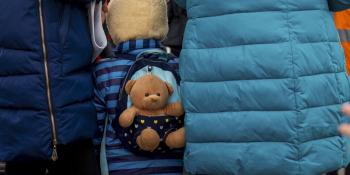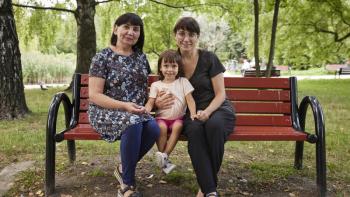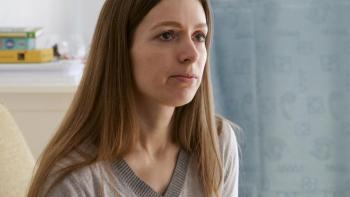
Daddy, what is war?
Family from Transcarpathia starts a new life in Hungary
“My son often asks: daddy, what is war? But how do you explain to a child what war is and why it started? Neither do I understand why this had to happen. What I do know, is that I didn’t want my family to experience any more of it. So we left.”
In August 2022, a few Habitat employees transported a load of household appliances to Nyíregyháza, a city in northeastern Hungary. This donation was for two refugee families from Transcarpathia, a border region of Ukraine, where many Hungarian-speaking families live. These two families started a new life in Eastern Hungary with the help of Habitat’s partner organization in Nyíregyháza, the Catholic Caritas Hungarica. We interviewed Sanyi, one of the fathers.

Sanyi talks about the obstacles they had to overcome to get to safety
Sanyi lived with his wife, Edina, and their 6-year-old son, Maxim, in a village close to the Hungarian border. He was a car mechanic, and Edina used to work as a pharmacist. During the first night of the war, Sanyi saw people fleeing and asked his wife to take their son and leave Ukraine the very next day. He had to finish repairing a couple of cars before joining them and managed to follow his family three days later. Since he holds both Ukrainian and Hungarian citizenship, he was allowed to leave the country, unlike other Ukrainian adult men. His family was waiting for him at a small village nearby.
“When I crossed the border, everyone was ready to help. Three volunteers came to me simultaneously and immediately asked what I needed: food, transfer, anything. It was incredible. I was so touched – says Sanyi, who missed his wife and son very much – We have never spent time apart.”
At first, the family planned to stay in Hungary only for a couple of days. However, as the war raged on, they realized after a few weeks that they needed to start a new life here. In early March, they met Tamás Szabó, a priest at the local Catholic church. With his help, Sanyi started working for Caritas Hungarica. Later, with the support of the same organization, they secured a long-term rental in Nyíregyháza, and Edina found a job as translator in a local school, helping refugee children from Ukraine.
Their son, Maxim, went to school, but the first month was difficult for him. He didn’t understand what was happening and had difficulties getting used to the new environment. He cried a lot and wanted to go home. With time things got better. The little boy considers himself a citizen of Nyíregyháza now and the family is successfully adjusting to the new situation.
“We were fortunate because we got so much help early on, and we spoke Hungarian. We have a job, and we look ahead to the future. However, we often think of going back home. We are homesick. I miss the Tisza riverbank very much,” concludes Sanyi.

